Pirates are one of the more popular themes in modern pop culture. It’s no surprise this popularity extends into board gaming. I have compiled a Top 10 Best Pirate Board Games in 2023 as a guide for everyone who is looking to buy a pirate board game or is just generally interested in board games.
Best Pirate Board Games in 2023 – Honorable Mentions
Maracaibo
This masterpiece from Alexander Pfister just barely didn’t make the list, and it all has to do with the theme. While it’s mechanically outstanding, them is not its strongest point, and pirates are only a small part of it.
Port Royal
Interestingly, this one is from Mr. Pfister, as well. Port Royal is a very simple card drafting and set-collecting game with a strong push-your-luck element. It’s excellent as a filler game. It’s a lot of fun, but also quite luck-dependant. READ MORE HERE
There are affiliate links by the titles. I am affiliated with Amazon (as well as with some other stores) and will earn a commission if you buy something through my link.
10. Rum & Bones and Rum & Bones: Second Tide
Designer: Michael Shinall
Published in: 2015/2017
Players: 2, 4 or 6
Playing time: 60 minutes
Complexity: light-medium
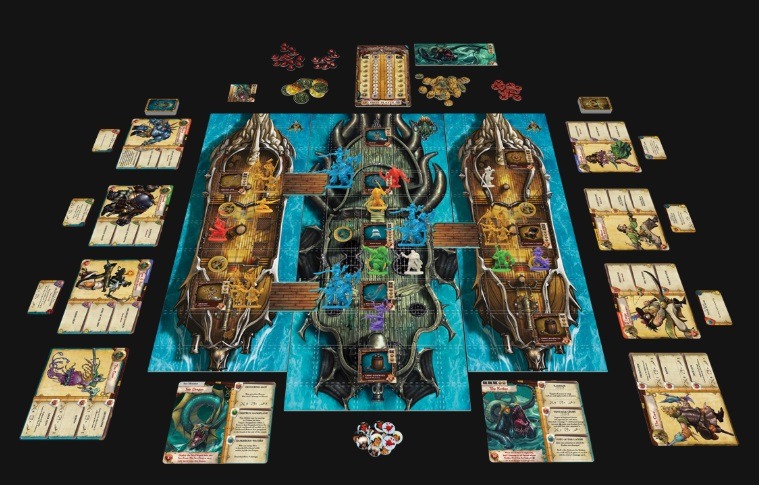
If you are a fan of MOBA video games (multiplayer online battle arena) and wondered how would a concept like that work out on a tabletop, look no further. Although Rum & Bones is not the only MOBA board game (Cloudspire comes to mind), it’s the only pirate-themed.
In Rum & Bones, your playing board is the pirate ships, entangled in a fight and ready to board one another. They are connected by three bridges – paths on which your ordinary pirates march towards each other.
But it’s not them who decide the outcome of the battle, they are after all nothing more than mindless grunts. Each side also has five hero pirates who are much stronger, more agile, and can turn the tide of the battle. They can even bypass the bridges via swinging ropes and get behind enemy lines quickly. Or fall into the check and lose the entire turn if your die roll is unlucky.
Teams aiming at destroying crucial strategy points
The goal of the game is to be the first one to collect six victory points. You do that by destroying strategic points on the enemy ship: rudder, spawn points, cannon, etc, and also by killing the Kraken, which joins the fight from the depths when such criteria are met.
Although there are only two sides, more than two players can play, forming teams. This works pretty well, but the game is still best experienced as a two-player game.
So, if you’re looking for a pirate-themed MOBA, Rum & Bones is your best bet, or more specifically, Second Tide, which is a revised and updated edition. It comes with several changes, most notably with a new dynamic leveling system, new ships, and alternating activation of heroes (players take turns, activating them and performing moves one by one).
Second Tide is a standalone game, but it can also be integrated with the original.
Rum & Bones and Rum & Bones: Second Tide
- MOBA board game.
- Interesting pirate/fantasy theme with nice miniatures.
- A lot of cool different factions available with expansions.
9. Dead Men Tell No Tales
Designer: Kane Klenko
Published in: 2015
Players: 1-5
Playing time: 60-75 minutes
Complexity: light-medium
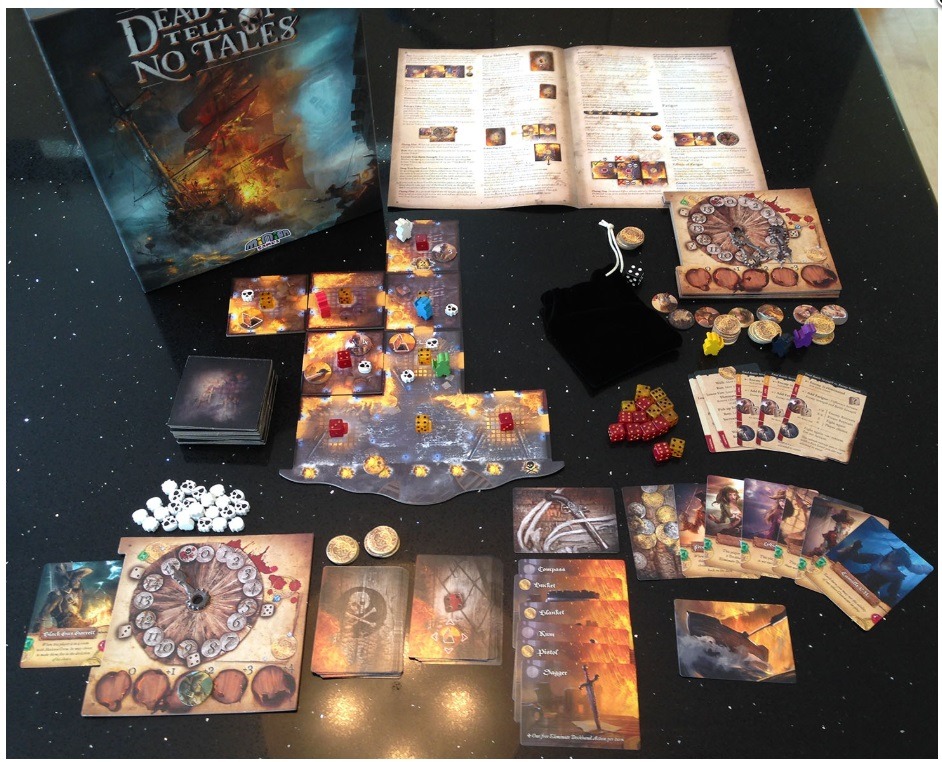
We’re sailing slightly into fantasy waters with this one. You and your crew have finally taken Skelit’s Revenge, the most feared ship out there. But it’s not over yet. You must now board the burning ship and take its loot before it gets destroyed or the skeletons and guards get you.
Dead Men Tell No Tales is a cooperative game. It reminded me a lot of Forbidden Island, only with more theme and meat.
Each player controls a pirate, and all have unique special abilities. All are useful and fairly balanced. Your goal is to find and recover loot tokens from the ship. The number of tokens you have to recover depends on the difficulty and player count.
The fire is growing stronger
The ship you’re on is represented with tiles, that are drawn from a deck every turn. Every tile has a d6 die, stating how much fire there is. If it reaches 6, the room explodes, destroying everything in it and increasing fire in adjacent rooms. If there is gunpowder in a room, it can go off even at lower numbers. Random tokens (treasure, deckhands, and enemies) are also drawn for tiles.
Players get 5 action points per turn, which they can spend doing any combination of the following:
- walk,
- run,
- fight fires,
- eliminate deckhand,
- pick token,
- rest,
- battle strength and
- swap items.
Some actions increase your fatigue meter (you need to rest to lower it). If it gets too high, you can’t enter rooms with too much fire and you can die in the worst-case scenario.
You can eliminate guards and skeletons by combat. This does not cost an action, but if unsuccessful, it will increase your fatigue and you may even be forced to retreat. Note that enemies are not the same as deckhands: deckhands must be removed by action (or they prevent you from entering the room), while enemies must be dealt with by combat as you enter their room.
Can pirates really cooperate?
When your turn ends, it’s time for the ship to do her stuff. You draw a Skelit’s Revenge Cards, causing various effects to take place: raising fire levels or adding more deckhands.
While there’s only one way to win (retrieve the loot and make it safely back), there are several ways to lose:
- Explosion (explosion meter reaches the end)
- Trapped (can’t legally place a new tile)
- Overwhelmed (you run out of deckhand tokens to place)
- Lost Treasure (if treasure tokens get destroyed in explosions)
- Untimely Death (if a pirate dies after the treasure has been looted)
- No More Pirates (if a pirate dies and there are no more character cards to replace him)
As you can see, there are a lot of things to look after and only a well-coordinated team will succeed, especially on higher difficulties. Fire and deckhand mechanics will be your main opponent but don’t take too much time, or you’ll become trapped in a burning ship!
Dead Men Tell No Tales is a great cooperative game, but just like other cooperative games with open information, it suffers from the alpha player syndrome (people telling others what to do). You know how people you play with are. In good company, this is a very fun and enjoyable experience.
Dead Men Tell No Tales
- Challenging cooperative gameplay with a lot of things to look after.
- Fun theme and good components.
- Can suffer from the alpha player syndrome.
8. Jamaica
Designers: Malcolm Braff, Bruno Cathala, Sébastien Pauchon
Published in: 2007
Players: 2-6
Playing time: 30-60 minutes
Complexity: light-medium
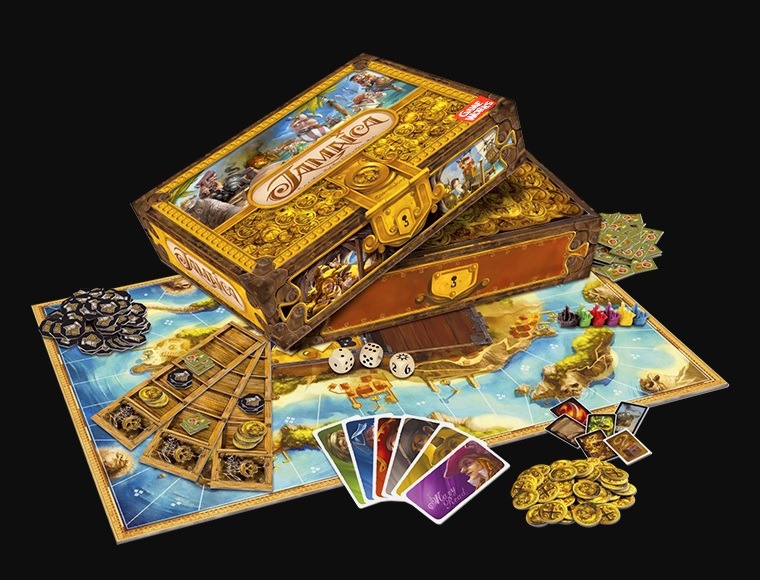
Date: late 17th century. Location: Jamaica. Captain Henry Morgan, the Governor of Jamaica and a retired pirate, invites his former colleagues to the annual race around the island to remember the good old days of looting and impunity. Whichever captain accumulates the most gold on that one lap around the island, is declared the winner.
Behind this funny setting lies a family “racing” game. Sort of like a more advanced pachisi, only that your choices in Jamaica actually matter, you’re not just rolling dice.
Chucking dice is fun for the whole family
Each round, one of the players (the captain for that round) rolls two dice. Players then secretly designate two of their three hand cards with values on those dice (the so-called day and night die). All the cards are then revealed simultaneously and resolved in clockwise order.
Cards indicate actions one can do: load goods or move on the map. Players must balance their actions between both, to not stay behind in the race and to plunder as many goods (=gold).
Another way to earn gold is to make detours. Some paths are longer but contain treasures. It’s worth considering the trade-off and risk of staying behind for some extra gold.
If two players end up in the same spot, a battle is swiftly resolved with a die and the winner loots some gold from the loser.
The game ends when the first ship reaches the finish line. Winnings are calculated – the closer to finish you are, the more you get. This is then added to the gold already on the ship (the goods you looted on the way) to determine the overall winner.
Intuitive mechanics and beautiful art make this a modern-classic family board game, one that you and your kids will play again and again.
Jamaica
- Easy to learn and very fun to play, ideal for family nights.
- Beautiful artwork.
- Good balance between luck and strategy.
7. Libertalia
Designer: Paolo Mori
Published in: 2012
Players: 2-6
Playing time: 40-60 minutes
Complexity: light-medium
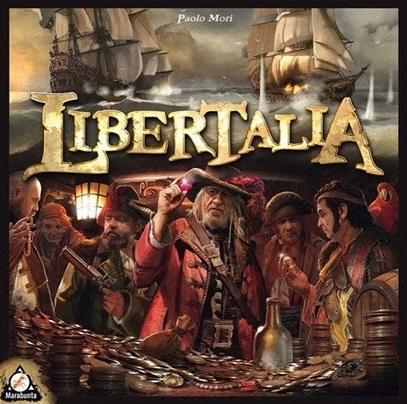
Do you know what all pirates want before they retire? That’s right, that one last big hit, a big loot to assure them a safe retirement. You play as one such pirate, but the competition is harsh. You’re not the only one looking for a pension!
Libertalia is a card and hand-management game. If you don’t like luck affecting your games, you’re in luck with Libertalia (sorry for the bad pun). There’s no luck involved, just pure strategy. Here’s how it works.
Each player starts with an identical set of cards. These are randomly drawn from a larger deck to ensure variety. Then players place the cards (crew members) on the main board, which represents a ship. The higher the rank of the crew member, the more booty tokens he gets for you.
Simple, yet challenging card game
So, where’s the catch, you may ask? There are several:
- Crew members also have special abilities that come into play during the round. Some even have recurring abilities, that grant you bonuses even in subsequent rounds. Make sure to play them early (of course, these are usually low-ranked)!
- After the first six rounds, players draw six new cards (again identical), but the three cards from before stay in their hands. Thus, in later stages (there are three stages), each player’s deck will be very different, yet with careful card-counting, it’s still possible to know opponents’ hands.
After all three stages (campaigns) are through, the player with the most money wins.
You will use 18 of the 30 different cards, making the game different each time. Although the game is not that complicated, with luck being such a low factor, new players will have a hard time against experienced peers. Remember to cut them some slack!
Since the original is no longer in print, I suggest you go for the revised edition, Libvertalia: Winds of Galecrest.
Libertalia
- Simple, yet strategic card game.
- Good-looking art and quality components.
- Deterministic (not much luck involved).
6. Friday
Designer: Friedemann Friese
Published in: 2011
Players: 1 player only
Playing time: 25 minutes
Complexity: light-medium
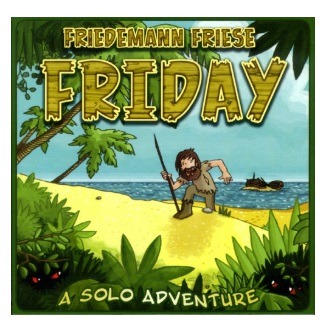
What happens with all those sailors lost to the sea, either by combat or storms? Perhaps some are saved, and others are less lucky. But if there’s Robinson Crusoe among them, chances are he’ll end up marooned on a deserted island.
Now enters Friday, one of the natives Robinson met and became his faithful friend. (Idea for a board game name: Wilson). You play as Friday, fighting hazards the island throws at you and preparing for the final showdown: fighting two evil pirate ships and helping Robinson Crusoe to escape from the island.
Having fun – on my own
Friday is a special game – it’s a solitaire deck builder. You start with a basic deck of cards. Each round you draw two danger cards and decide which one of them to fight. It’s a tough choice. But the tougher the fight, the greater the potential reward.
Then you draw cards from your deck to check if you beat it. If you win the fight, you get to keep the danger card and add it to your deck.
If you don’t beat the danger card, you can spend life points (lose too many and you lose the game) to draw more cards or choose to fail. This gives you the option to remove a played card from your deck (a way to get rid of useless cards). But of course, you end up without a new, stronger card for the round.
As rounds go by, you fight tougher and tougher cards, until the last round, where you fight a pair of pirate ships. You better have your deck prepared by then, because Friday is a tough nut to crack.
Friday is a very challenging, quick, and simple game. It’s something you bring out if you are on your own and have half an hour to kill. You will probably lose, but you’ll also want to try again because beating a tough game makes winning all the more pleasurable.
Friday
- Only for one player
- Very quick gameplay
- Challenging
- Cheap
5. Islebound
Designer: Ryan Laukat
Published in: 2016
Players: 2-4
Playing time: 60-120 minutes
Complexity: medium
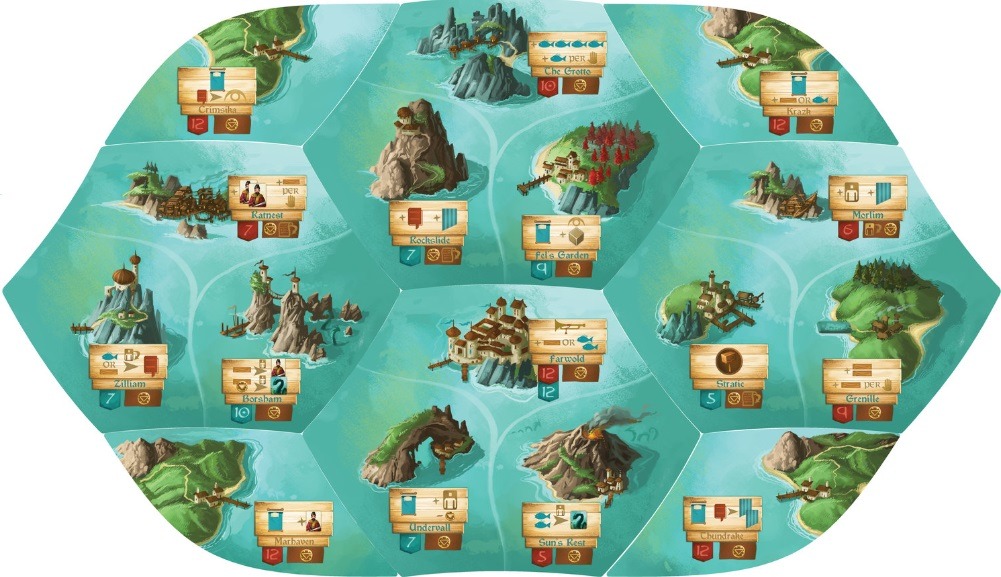
Ryan Laukat is a prominent game designer and the founder of Red Raven games. He’s famous for doing the entire design himself, together with art. Above and Below is probably his most famous game (some components from Islebound work as an expansion for it!) and Islebound is set in the same universe.
Each player takes on the role of a clan leader and sets sail on the (semi)modular archipelago. You can hire crew, complete quests, collect treasure, build buildings, trade with islands, conquer them, or win them over with diplomacy. You’ll earn renown (victory points) for your deeds which is what wins you the game.
Another Ryan Laukat masterpiece
The concept is easy to understand – it’s a simple move-and-take-action mechanic. Movement is a must (how far you can move is determined by your ship’s speed), while the action is optional. Possible actions are:
- Trade with an island: pay something to get something else in return.
- Conquest an island with military power.
- Obtain the island by paying diplomacy.
- Collect treasure (gold paid to the bank by other players).
Owning islands is rather important. Not only does it earn you renown, but when other players use its services, the paid costs go into your pocket directly. Once the island is conquered, it’s also significantly harder to re-conquer it (the enemy must pay double strength or diplomacy).
After that, you also get free action. That means that you can complete a quest (you gain diplomacy) or construct a building in your capital. Buildings are another very important mechanic of Islebound. They give renown and also act as the trigger for the game’s end. This happens when the first person completes 7 buildings.
The strategy revolves around clever management of your crew (they have different, specialized abilities), conquering key islands, completing valuable quests, and then racing toward those 7 buildings. The mechanics are well-balanced and thought out and there are a lot of things to look after.
Board tiles are double-sided, the second side being “advanced”, which takes care of variability. But it would be nice to have different end-game triggers. Right now, every game turns into a race for those buildings. It gets a bit old after a dozen plays. This problem is somewhat mitigated with the recommended Metropolis expansion.
Islebound
- Simple and engaging mechanics, with various strategic options.
- Very appealing art style.
- Smooth and fast gameplay.
4. Treasure Island
Designer: Marc Paquien
Published in: 2018
Players: 2-5
Playing time: 45 minutes
Complexity: light-medium
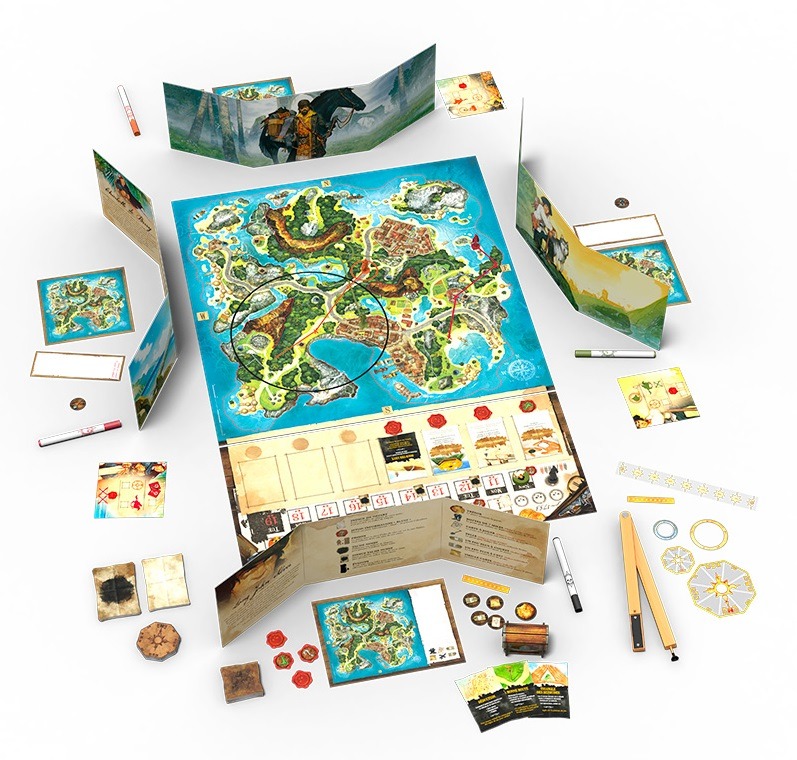
After the bills are paid, all the grog and ladies are gone and you’re still left with plenty of booty, which you just can’t have it sitting around on your ship (you need space for fresh booty, after all) – what do you do with it? You bury it in a secret location, of course.
Let’s play hide-and-seek (the treasure)
The premise of Treasure Island goes something like this. Captain Long John Silver has been cornered by his crew to give out the location of his treasure. Threatened with life, he has no other choice, but to give directions. Or perhaps misdirection? Surely the old buccaneer has an ace up his sleeve and is planning to escape and get the treasure for himself.
The game mechanics behind this are pretty clever. One of the players (preferably the most experienced) plays as Long John. He marks the location of the treasure behind his screen and then gives out clues to other players. They move their meeples on the picturesque island, interpreting clues, looking for treasure.
Searching is done by drawing circles on the map (small and large search) and if the treasure is in it, you win. Erasable markers, rings, and rulers are provided and the board looks really cool with all the searches and other lines on it.
Long John has a couple of bluff tokens available, meaning he can lie twice per game. Players can check that (to make sure they’re on the right track), but it costs an action.
After a while (day 17 in game terms), Long John escapes and heads for the treasure himself. If he gets there before the players, he wins. This is a great way to break the deadlock (if the players get stuck) and move the game along.
Playing the players
Of course, a lot of the gameplay happens behind the scenes. Observing what other players are doing, where are they searching, how are they moving, and assembling the clues together. Even if you find out where the treasure is, you must be careful to not go for it too obviously or an avid co-player might pick up on what you’re doing and get there ahead of you.
It’s similar when Long John joins the search. He knows where the treasure is, but he can be damn sure other players are following his every move, and being outnumbered, he’s in a delicate position. You must trick other players, leading them elsewhere … or go straight for the treasure and make them think you’re tricking them. It’s that kind of game.
Treasure Island
- A fresh approach to deduction genre, with a map you can draw on.
- Engaging gameplay, getting into each other’s heads.
- Easy to play with great art and components.
3. Francis Drake
Designer: Peter Hawes
Published in: 2013
Players: 3-5
Playing time: 90-120 minutes
Complexity: medium
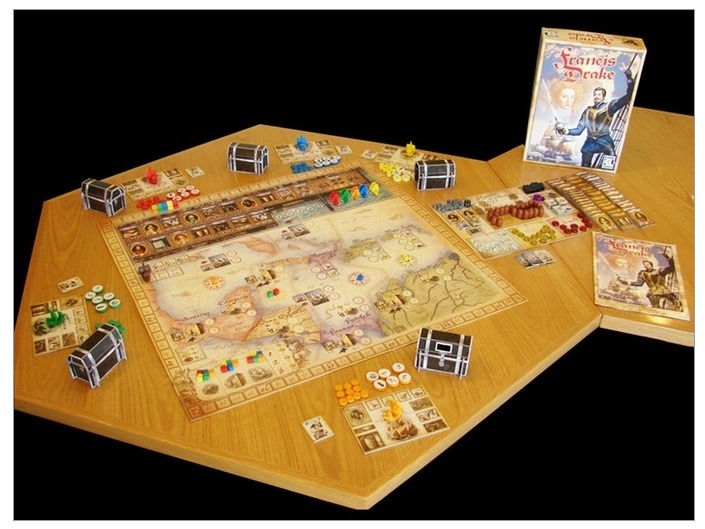
What do you call a pirate that is given a government grant and protection to carry out his operations against an enemy? Yep, that’s a privateer. A legalized pirate, but a pirate nonetheless, especially in the eyes of the enemy. There were many privateers employed, but perhaps Francis Drake is the most famous.
You play as one of the privateers. The Queen of England has authorized you to disrupt the Spanish Empire in the Caribbeans. You have 3 voyages (rounds) to do as much damage as possible (=collect victory points). There isn’t any direct interaction between the players, just fierce competition for supplies and treasures.
Francis Drake is mainly a worker-placement game. Each of the voyages is split into two phases:
1. Supply phase
You (and your fellow privateers) are in the port of Plymouth. Your task is to prepare for the voyage ahead. You visit the shops one by one: hire crew members, buy guns, trade goods, gather supplies, or visit special slots, like the Queen (can upgrade your Frigate into Galleon), the Governor, the Admiral, or the Informer, each giving special ability.
The trick here is that you must visit the shops in order, but you can skip ahead. This is also important because if you’re the first one done with supplying, you’ll be the first to pick the slots on the Voyage phase.
Balancing your supplies is crucial. You want to be fully prepared for the voyage, but delay your departure too much and all the good slots in the Caribbeans will already be taken. You have to plan your journey ahead (you don’t have to arm if you only plan to trade and vice versa) and occasionally take a risk or two.
2. Voyage phase
Now is the time to place your discs on the Caribbean slots. There are four types: trade ports for trading, towns for capturing, forts, and Spanish Galleons (require you to own a Galleon) for conquering. Capturing objectives grants you prizes; resources and victory points. The first one to plunder a location also gets a bonus.
When the discs are placed, they are flipped, exposing a number. This determines the order at a location (only two slots are at each location).
Deciding which discs to put where is the meat of the game, especially when you consider that you do not have to plunder a location you put a disc on. You can only bluff or block other players from plundering for a bonus.
After all the locations are through and you have spent your resources, you return to Plymouth to prepare for the next one. The first one to return is the first one to supply…
For the next two voyages, the supply line is changed, just to avoid every supply phase feeling the same. After three voyages, points and loot are counted and the winner is declared.
Francis Drake is a great mix of worker placement (+ hidden placement), bluffing, and pushing your luck, packed in an appropriate theme, that just works well together. The artwork is beautiful and the components are of high quality, from the thick map, plastic barrels, and ships to gold, silver, and jewel tokens.
Francis Drake
- A mix of worker placement, deception, and bluff.
- High-quality components and art.
- The theme works well with the mechanics (supply and voyage phases).
2. Merchants & Marauders
Designers: Kasper Aagaard, Christian Marcussen
Published in: 2010
Players: 2-4
Playing time: 180 minutes
Complexity: medium
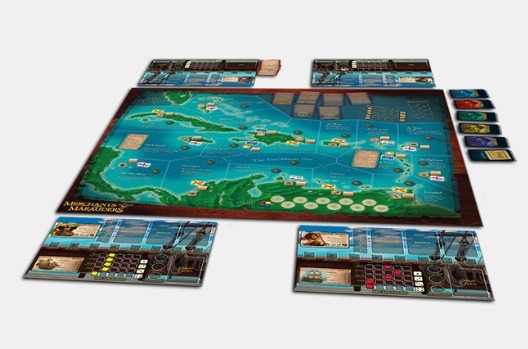
Being a pirate is all about freedom (as Hollywood would have you believe) and Merchants & Marauders excels at freedom.
You are given a ship and a captain, the map of the Caribbean is in front of you and the rest is up to you. You can be a good guy, earning your living with honest trade or you can be a dirty filthy pirate, raiding other ships.
The core mechanics are pretty straightforward. Each turn, you get three action points and you spend them doing any combination of the following three things:
- Move between zones or between port and sea.
- Scout, meaning you look for other ships. This can mean both NPC (non-player-controlled) ships or ships from other players.
- If you’re at a port, you can interact with it. Recruit crew, buy/sell goods, repair, upgrade or even buy a new ship.
Raiding merchant ships is pretty simple and is solved by drawing cards that determine whether a part of your ship gets damaged or the other ship escapes. If you’re successful, you keep the cards you drew as goods (if you can fit them into your cargo space).
Soon you will gain bounties to your name and there will be NPC ships coming after you. Your bounty may even entice other players to try to collect it. Either way, eventually full ship-to-ship combat will start, usually ending with a lot of damage to both parties. You can try to sink or board the enemy’s ship. Successful boarding grants you the ship with all its cargo.
A pirate’s life is unpredictable
Although the stats of your captain and the ship matter in combat, it’s worth pointing out that luck also plays a significant part. Fortunately, it’s not game over if you lose your ship. You simply start over with a new captain and basic ship. It’s not ideal losing all your belongings, but you do keep your glory points and stashed goods, so losing your ship is not the end of the world.
Collecting 10 glory points is what wins you the game. Everything you do is just a means to earn them. But they’re not easy to come by – you only get them for significant in-game achievements: buying a galleon or a frigate, raiding a merchant for 12 or more gold, selling in-demand goods, stashing gold to your hideout, completing special missions, and destroying other ships.
The gameplay is fast, thematic, and engaging. You have a lot of freedom, there is always something to do. Losing your ship is not detrimental and, with your bounties cleared, you get the opportunity to try out a completely different approach.
Merchants & Marauders is not a eurogame with careful planning, analyzing, and calculating the best move. But I think this is a good thing. It’s a thematic (Ameritrash, as they are called) open-world game, where you sail and make your moves on your gut feeling, always praying to have the gods on your side.
Merchants & Marauders
- Open-world game granting complete freedom to players.
- Very thematic, you’ll feel like a real pirate (or a merchant, if you choose so).
- Luck-dependent combat.
1. Forgotten Waters
Designers: Mr. Bistro, J. Arthur Ellis, Isaac Vega
Published in: 2020
Players: 1-7
Playing time: 120-240 minutes
Complexity: light-medium
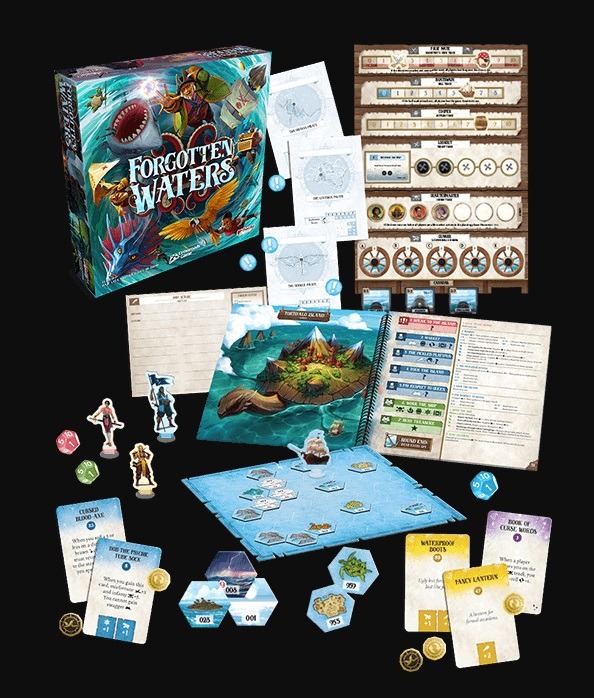
For the last title on our list, we’ve got something special in store for you. Forgotten Waters is a crossroads story-telling adventure. This means that you’re a part of a pirate ship crew, going from one adventure to another, making decisions, performing skill checks, and accepting the consequences.
Each adventure is a separate scenario, that takes about 4 hours to complete and you get the option to “save the game” halfway through, dividing the game into manageable 2-hour chunks. To win a scenario, all players must survive. Each player also gets a personal agenda, making individual wins a possibility as well.
Accessible and hilariously fun
The game works as a blend of several components and mechanics (personal sheets, various tokens and markers, a hexagonal world map with a location book, dice, and so on). But what really holds everything together and makes it more than just the sum of its parts, is the fantastic digital app.
The storytelling in the app is nothing short of world-class. Lighthearted pirate humor with jokes (Monkey Island comes to mind), immersive narrative with voice acting, and even ambient music. The lines between a board game, video game, and book have never been so blurred, making Forgotten Waters a brilliant multimedia experience.
Sure, Mansions of Madness (2nd Ed.) and LotR: Journeys in Middle-earth already showed us what can be done with a good app, but I dare to say that Forgotten Waters is one step above them. If you have a group (the game is best played with at least 3 players) that is looking for a cooperative and highly imaginative adventure with a top-notch narrative, you’ll have a blast with Forgotten Waters.
And with the light and easy-to-learn game mechanics, Forgotten Waters is also ideal for families or casual groups.
Forgotten Waters
- Immersive story-telling.
- One of the best app integration to date.
- Ultimate pirate adventure.
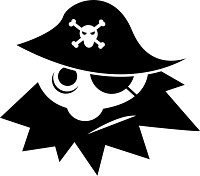
We have always done family game nights and I have been looking for some new ones. I am a big history and pirates fan, I like strategy games.
I am going to order the Francis Drake for me it seems to check all the boxes. I like the way it is laid out – it looks like a game where you have to plan your moves ahead and do some thinking.
Francis Drake is great, you’ll love it!
The only board game out of all this that I have played before is Treasure Island. I played it at my friend’s house once and we really enjoyed looking for treasure on the ever-changing map.
Thanks for the recommendation on other pirate board games, it’s a always a good thing to have more choice. I will definitely look into some of the games on your list.
Loved the article!
I’m glad you enjoyed the article. Treasure Island is a great game, but yes, explore further. Many more good pirate board games are available.
I think Black Fleet should AT LEAST get an honorable mention. I would definitely put it as top 5. Delivering cargo, attacking freighters or other pirates, escaping the navy, stashing loot at hideouts.. so many fun pirate actions. Check it out if you haven’t played it.
I’m happy you like it and it would definitely be a top 5 on your list. I’ll check it out when I have the chance. 🙂
Dead Reckoning didn’t even get an honorable mention?
It’s a relatively new game and I haven’t tried it yet. Maybe next year. 🙂
Your dedication to providing informative content is commendable Best regards
This was a very enlightening article. I appreciate the depth of your analysis. Regards
Exceptional post! Your analysis is spot on. Thanks for sharing! Regards